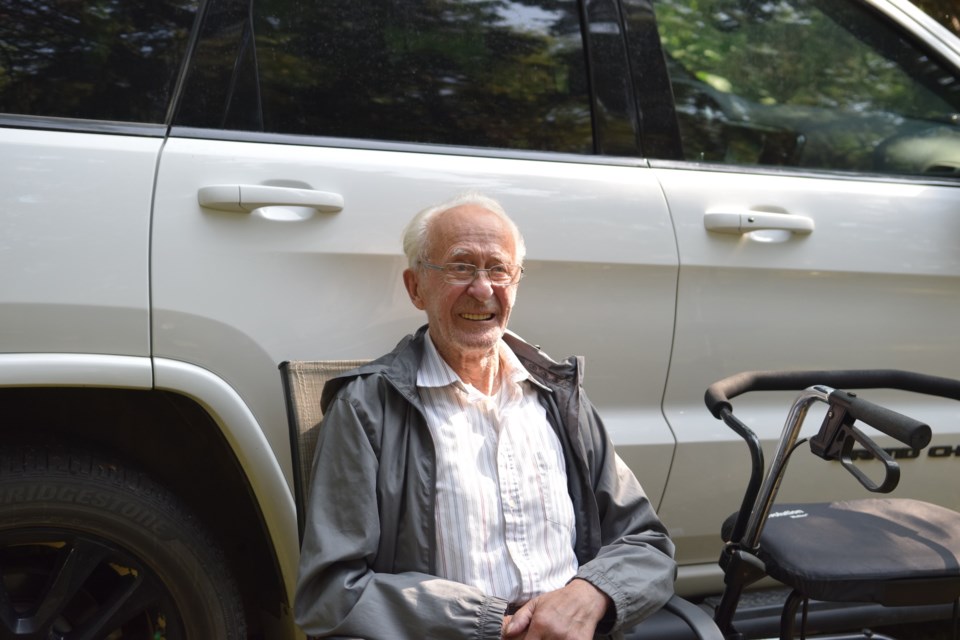BARRHEAD - It was a special day for two families and several people involved in maintaining Bethel Baptist Cemetery.
On July 12, representatives of the Smith and Beaver families, along with about a dozen people from the Barrhead Church of Jesus Christ of Latter-day Saints, gathered for a special event at Bethel Baptist Cemetery, the replacement of the old, hard-to-see gravemarkers, with new stone gravemarkers set on concrete blocks.
About 19 km west of Barrhead on Highway 18, the cemetery is the last resting place for 13 inhabitants of one of the province's original Black settlements, including those of the Smith and Beaver families. A 14th person, a granddaughter of two original Campsie settlers, was buried at the cemetery long after it was decommissioned in 1950.
"Feels excellent," Ron Smith said, whose grandparents, Edward Leonard Smith and Susie Alena Smith and an unnamed uncle or aunt are buried at the cemetery. "The new Blacks don't understand what [the people buried here] did for us. They opened the land without phones, cars, or anything and cleared five acres a year. My grandmother [who grew up in Amber Valley] said my grandfather could go down to the river for an hour and be able to catch enough fish for a week, shoot a deer, and get wood for the stove. Really, there are no more Black people in our time that can associate and understand what they did, but we are the ones who get all the benefits from their efforts."
Christine Beaver, whose grandparents are also buried at the cemetery, said they owed much to the Barrhead Church of Jesus Christ of Latter-Day Saints.
"Clearing the cemetery years ago was just great, but now it is even more significant, with our ancestors and community builders honoured with these beautiful markers," she said. "This land used to belong to our great-grandfather, so it is a real family story and has come full circle.
"They came up here from the troubled lands in the United States, worked hard and struggled; without their sacrifices, we wouldn't have had the good fortune and lives we have now."
According to census records, about 1,000 Black settlers came to Alberta from the U.S., mainly from the southern states, from 1905 to 1911. The majority of these settlers chose to settle in Amber Valley (near Athabasca), Breton (near Drayton Valley), Junkins (near Wildwood) or Eldon and Rosetown in Saskatchewan. However, 36 homesteaders or about 30 families, settled in Campsie. At its height, the settlement had upwards of 70 settlers.
Bill Warwaryick said the project has been in the works for at least two years. In August 2022, church members who have unofficially maintained the cemetery since 1997, during one of their regular cleanup sessions, noticed that the aluminium nameplates that the church installed in the early 2000s were starting to fade, to the point that many were illegible.
Later that year, the Barrhead and District and District Community Family Support Services (FCSS), who were looking for a project to commemorate Black History Month, got involved, offering to help fundraise the estimated $8,000 needed.
Warwaryick noted they are still about $2,100 short of what they need. However, he said the company that made and installed the new gravemarkers, Rose City Memorials, completed the project, knowing the church/FCSS would settle the bill following.
Those who wish to contribute to the campaign can call Barrhead FCSS at 780-674-3341 or e-mail [email protected] to learn how.
Art Gibbs, 92, was one of the original church members involved in the project. He notes that he first learned about the cemetery from one of his neighbours, who knew several of the original Campsie settlement settlers. He then told the church, which got involved soon after.
"We were the instigators, you could say, of clearing this out," he said. "It was a jungle, just heavy brush."
Nathan Hoag, who now lives in Edmonton, was also one of the volunteers from the initial work party who visited the cemetery with his daughter and said it was amazing to see what the church had done.
"I was 17 at the time," he said. "To see the change from that first work party is hard to believe."
Barry Kerton, TownandCountryToday.com


.jpg;w=120;h=80;mode=crop)
